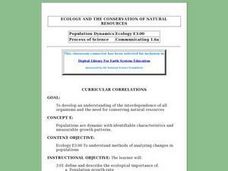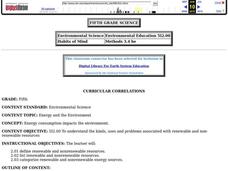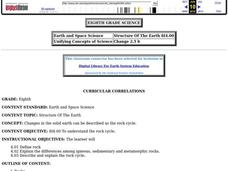Curated OER
Population Dynamics (Lesson 2)
Middle schoolers discuss the importance of population growth rates. They examine mortality and survival curves and participate in an experiment. They record their observations and discuss.
Curated OER
Earth's Ecosystem: Seven Major Biomes
Students discuss the different types of ecosystems and the composition of biomes. Working in groups, they define various related terms and make posters of them. Then they explain their posters to the class.
Curated OER
Ecology and the Conservation of Natural Resources Lesson 2
Students compare and contrast abiotic and biotic factors. They discuss how these factors effect ecosystems. They answer questions to complete the lesson.
Curated OER
Structure of the Earth
Eighth graders describe and identify the three layers of the Earth. They work together to construct their own earth model. They share their creation with the class.
Curated OER
Science Processes
Fifth graders observe a dry piece of bread and a damp piece of bread in two separate sealed bags that have been sitting for several days that have been labeled. The observe the mold with a hand lens and record findings in their science...
Curated OER
Animals
Second graders define and describe the characteristics of a mammal and a mammal's importance to man. They also describe the life cycle of a frog and compare and contrast a larva and an adult frog. Finally, 2nd graders study and explain...
Curated OER
Science In Society
Fifth graders study diseases that are related to the use of alcohol, tobacco, and drugs, both prescription and illegal. They determine illnesses that can occur as a direct result of the use of or inappropriate use of these substances....
Curated OER
Rock Cycle
Third graders identify various types of landforms of the United States. They discuss earth movements that produce geologic structures and landforms and define cycle as it relates to rocks and soil. They demonstrate the processes forming...
Curated OER
Matter & Subatomic Particles
Seventh graders divide into small groups to construct several models. Each group builds with an accompanying chart showing the colors of gumdrops used for the protons, electrons, and neutrons.)
Curated OER
Making a Battery and Energy Transformation
Seventh graders determine what makes a battery work. In this battery lesson, 7th graders brainstorm ideas about how they think batteries provide energy. They perform an experiment in which they work as a team to assemble a battery. They...
Curated OER
Meteorology (Condensation)
Second graders define condensation and evaporation. They identify and describe the steps in the water cycle. They ask questions to end the lesson.
Curated OER
Day And Night
First graders examine how the earth experiences day and night by using a flashlight and a globe as a model.
Curated OER
Keep the Environment Clean
Students discuss ways our environment becomes polluted. They make a list of ways to keep it clean.
Curated OER
Energy and the Environment
Fifth graders define terms associated with renewable and nonrenewable resources. They identify materials that are renewable and nonrewable. They categorize a list into the correct type of resource.
Curated OER
Fossil Fuels
Fifth graders explore the use of fossil fuels and relate it to effects on the environment.
Curated OER
Structure of the Earth
Sixth graders define atmosphere and hydrosphere, explore through experimentation how the atmosphere was formed, and describe the layers of the Earth's atmosphere and their distances.
Curated OER
Structure of Earth
Seventh graders study and make a model of the significant formations of the ocean floor. They examine images and illustration and apply their imagination while creating the model. They are challenged to complete further research as an...
Curated OER
Structure of the Earth
Eighth graders explain the difference between igneous, sedimentary and metamorphic rocks. They identify the stages in the rock cycle. They discover the origin of rocks as well.
Curated OER
Plant Reproduction
Fifth graders discuss the way a plant can reproduce from roots, stems, and leaves instead of the more familiar way of flowers, fruits, and seeds. In groups of four, 5th graders pick a plant group. Each group then writes a report,...
Curated OER
The Ocean Floor
Fifth graders discuss the process of sedimentation and the continental drift theory. They locate major structures on the ocean floor and they identify life forms at each level of the ocean.
Curated OER
Heredity, Genetics, Traits
Eighth graders study how an embryo develops into a fetus by undergoing many physical changes which they observe on a poster. They examine the metamorphosis of fruit flies as they develop through a series of changes. They record the...
Curated OER
Configuration Station #12
In this vocabulary worksheet, students study 5 commonly used words and complete 30 questions. Included are sentence writing, alphabetizing, word puzzles, opposites and illustrating.
Curated OER
The Rock Cycle
Third graders study the 3 main types of rocks: igneous, sedimentary, metamorphic. They examine samples of these types of rocks and discuss ways to tell what kind of rock each is. They take notes and draw pictures in their science...
Curated OER
Meteorology
Fourth graders study how atmospheric conditions change while naming the things that make the weather change. They investigate the affects of air masses, weather fronts and high/low pressure by looking at weather maps from newspapers.

























